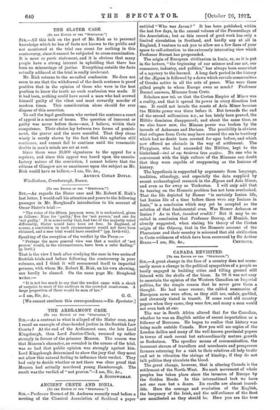ANCIENT CRETE AND IONIA.
[To THE EDITOR OP THE "SPECTATOR."]
Siu,—Professor Burnet of St. Andrews recently read before a meeting of the Classical Association of Scotland a paper
entitled " Who was Javan ? " It has been published, within the last few days, in the annual volume of the Proceedings of the Association; but as this record of good work has only a limited circulation in Scotland, and hardly any at all in England, I venture to ask you to allow me a few lines of your space to call attention to the extremely interesting view which Professor Burnet has propounded.
The origin of European civilization in Ionia, or, as it is put in the lecture, "the beginning of our science and our art, our commerce, industry, and politics," has always been somewhat of a mystery to the learned. A long dark period in the history of the ..gean is followed by a dawn which reveals communities of Greeks active in all the arts of peace. Who were these gifted people to whom Europe owes so much P Professor Burnet answers, Minoans from Crete.
Scholars now tell us that the Cretan Empire of Minos was a reality, and that it spread its power in every direction but one. It could not invade the coasts of Asia Minor because the Hittite power was there before it. But towards the end of the second millennium B.C., as has lately been proved, the Hittite dominion disappeared; and about the same time, as we also know now, the Minoan power was broken by the inroads of Achaeans and Dorians. The possibility is obvious that refugees from Crete may have crossed the sea to territory which had no doubt been coveted for ages before, and which now offered no obstacle in the way of settlement. The Phrygians, who had succeeded the Hittites, kept to the hinterland—hrel o6 fro OaAacrout rpya JAE/AXEL. No one who is conversant with the high culture of the Minoans can doubt that they were capable of reappearing as the Ionians of history.
The hypothesis is supported by arguments from language, tradition, ethnology, and especially the data supplied by recent archaeological research in the h]gean and Asia Minor, and even as far away as Turkestan. I will only add that its bearing on the Homeric problem has not been overlooked. That the life depicted by Homer "is certainly Ionian life, but Ionian life of a time before there were any Ionians in Ionia.," is a conclusion which may yet be accepted as the solution of that fundamental crux, Was Homer Achaean or Ionian ? As to that, insudent eruditi ! But it may be re- called in conclusion that Professor Drerup, of Munich, has already suggested, when stating his theory of the Cretan origin of the Odyssey, that in the Homeric account of the Phaeacians and their country is mirrored that old civilization in Crete evidences of which have been recovered by Sir Arthur


















































 Previous page
Previous page